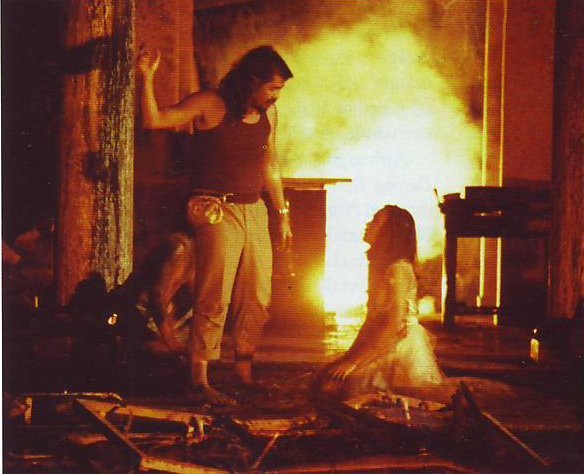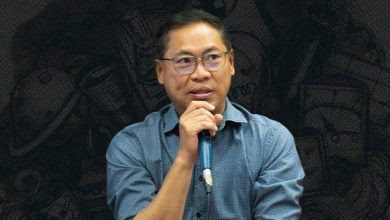MANILA, PHILIPPINES – His guidance and instruction helped shape generations of filmmakers and artists.
The Philippine film industry has lost one of its giants with the passing of Director Peque Gallaga last May 7, 2020 at the age of 76. A prodigious filmmaker with an oeuvre that spans multiple genres—from historical epics to fantasy; horror to young love; comedy and more—Gallaga’s career straddled the worlds of theater, film and television, advertising and the visual arts, where he left an indelible imprint in each not only as an artist and creator, but also as a mentor, guide, and inspiration to many. Those he had help mold and nurture would eventually move on to carve their own successful names in their respective fields, proof of his significant influence and mentorship.

Among the awards Peque Gallaga received include best production design for Ganito Kami Noon, Paano Kayo Ngayon in the Metro Manila Film Festival and Gawad Urian; Best Direction for Oro Plata Mata in the Gawad Urian and Manila International Film Festival; Best Direction for Unfaithful Wife at the Catholic Mass Media Awards and Star Awards. He also received a Gawad Urian Lifetime Achievement Award in 2009.
“My dearest friend, mentor, my teacher the “keeper of my person/a”, my rescuer, and most ardent director Peque has just passed away,” writes Cherie Gil—who played the blossoming teenager Trining Ojeda in Oro Plata Mata and the faded opera singer Regina Cadena in Sonata—in an eloquent Facebook post. “It’s like a whole era has passed for me. My life as an actor has died along with him too. I am as an actor because of him.”
Ronnie Lazaro was then taking up accounting at the University of Saint La Salle in Bacolod in 1974-78 when, in sophomore year, he joined an inter-play competition where Peque, who was teaching Mass Communication subjects, was one of the judges. Not long after, Ronnie was taken under Peque’s wing and tutelage, appearing in school productions such as the Ilonggo version of By the Skin of our Teeth, King and I, Funny Thing Happened on the Way to the Forum.
Upon graduation, Peque immediately invited Ronnie to join him in Manila. “He asked me if I wanted to do production work,” Lazaro recounts over the phone. “I ended up working in production design for Ishmael Bernal along with Kokoy Jimenez. I was involved in Manila by Night, Bilibid Boys, Pabling, and Ito Ba ang Ating Mga Anak? where Peque was the PD.”
Ronnie’s biggest break came when he was cast as Hermes Mercurio in Peque’s highly acclaimed 1982 debut epic Oro Plata Mata, which is unanimously considered by many as among the classics of Philippine cinema. “It was fun,” Lazaro says of his experience doing ‘Oro’. “Working with Peque was easy because he knows exactly what he wants from you as an actor. He’s not afraid to experiment [and did films] with an elevated approach.”

Even as he eventually pursued a different career trajectory on his own, Ronnie ultimately credits Peque for changing his life. “Peque opened my world to cinema in dimensions I never thought I’d find myself in.”
Veteran film editor Jess Navarro was in the incipient stages of his career when Peque tapped him to take on the editing of Oro Plata Mata. “It’s only now that I got to think of how I got that job,” Navarro shares via an online chat. “May nagsabi noon that they made a shortlist of editors and lucky for me, Peque chose me maybe because I had just done Batch ’81 and Kisapmata.”
Recounting his experience working on ‘Oro’, Navarro recalls, “I had to go to Bacolod several times on weekends during the shoot because Peque wanted to meet and discuss. I’d bring the dallies to watch kung may mali sa shot or kulang (if something was lacking in the shot). Every time I was there he made sure I was comfortable.” Editing 6 plus hours of footage was a major challenge but Navarro quickly earned Peque’s trust moving on to edit 9 of his films, including Virgin Forest and Scorpio Nights.

For his part, Eric Matti, the director behind acclaimed films as Honor Thy Father and On the Job, and who was one of Peque’s mentees and early acolytes, shared the valuable lessons he picked up from his former mentor. “Peque did not just teach me storytelling. He taught me to tell stories using the medium of cinema. For him, it’s not enough that we explore stories for film. We should explore the medium USING ITS ELEMENTS to tell our stories better.”
With all the accolades attached to Peque’s name, he perhaps best left his mark as well being a teacher and mentor to many, as co-founder and moving force behind the Negros Summer Workshops, the first of which was held in 1991. Bringing together a team of professionals from theater, film, television, and adverting as instructors, the workshops taught students from all over the country. Peque, of course, taught directing.
Among those who not only took part in the 1995 edition of Negros Summer Workshop but also had the privilege of having Peque as his teacher at the University of Saint La Salle was Law Fajardo, director of the award-winning film Imbisibol. “I took up a director’s apprenticeship sa kanya (with him) in 2006 because I had mostly a stage background,” Fajardo shares. “Genius siya (he is a genius). But he gave everything that he knew not only to us students but the whole Bacolod community and even the rest of the country. That he had a good heart was what impressed me the most.”

Sharing the same sentiment is Bacolod-based artist and cultural worker Manny Montelibano, a recipient of the Grabo sa Bisaya Award at the VIVA ExCon in 2016. “I facilitated a class of Don Escudero [filmmaker and close friend/collaborator of Peque] and a class of Peque in director’s apprenticeship back in the early nineties,” Montelibano shares. “Peque was a really good teacher as he brings out the best in you, he sees your capabilities and lets you work on it.”
Gabriel Fernandez, who was a regular instructor and facilitator in the Negros Summer Workshops from 2003 to 2010 writes, ”You were the greatest teacher there ever was. Long before the phrases “learner-centered” or “multiple intelligences were in vogue in academic circles, you were aware and practiced them in your classroom. The techniques you used are still today considered revolutionary.”

In a heartfelt Facebook tribute, which serves as a perfect bookend to this piece, Mauro Feria Tumbokon Jr., Founder of the Filipino arts and cinema international (FACINE) in San Francisco, writes thus:
“As a film practitioner whose body of works counts as one of the most remarkable in the so-called second—or third, according to some quarters—golden age of Philippine cinema as a actor…and as a director…he is considered a titan in Philippine Cinema. But most importantly, his legacy of mentorship of students in theater and film – he was mentor to now-acclaimed independent filmmakers Lawrence Fajardo and Erik Matti, to name a few – should be remembered by those who love and respect him.”
Indeed, he will be sorely missed.
About the Author
 Monchito Nocon is presently a public relations and marketing communications practitioner but with substantial exposure to the local film industry. Previously, he was heavily involved in the Society of Filipino Archivists for Film (SOFIA), National Commission for Culture and the Arts (NCCA), and the Film Development Council of the Philippines (FDCP).
Monchito Nocon is presently a public relations and marketing communications practitioner but with substantial exposure to the local film industry. Previously, he was heavily involved in the Society of Filipino Archivists for Film (SOFIA), National Commission for Culture and the Arts (NCCA), and the Film Development Council of the Philippines (FDCP).








